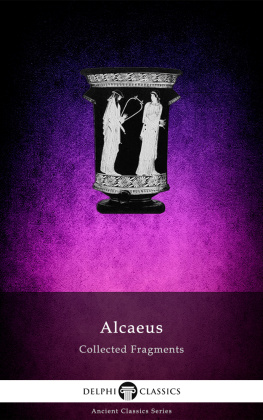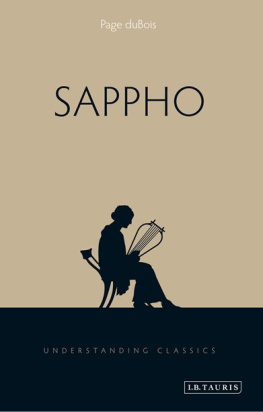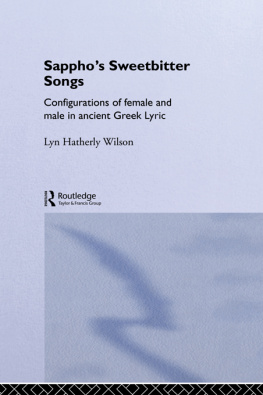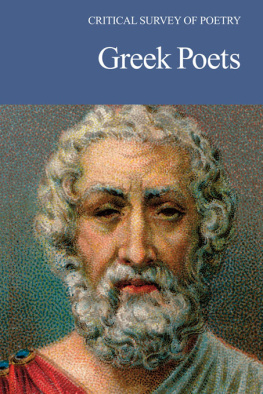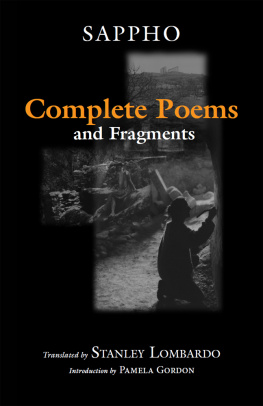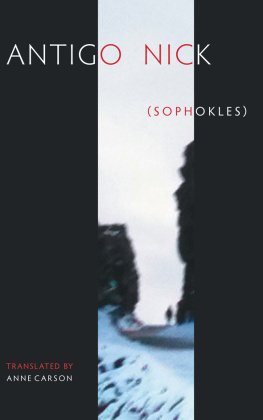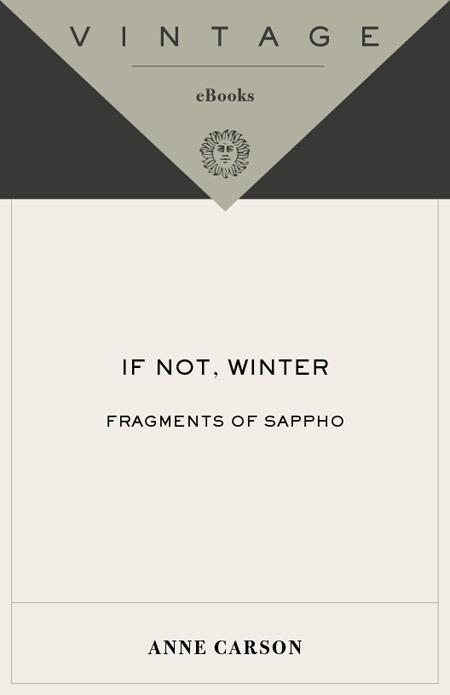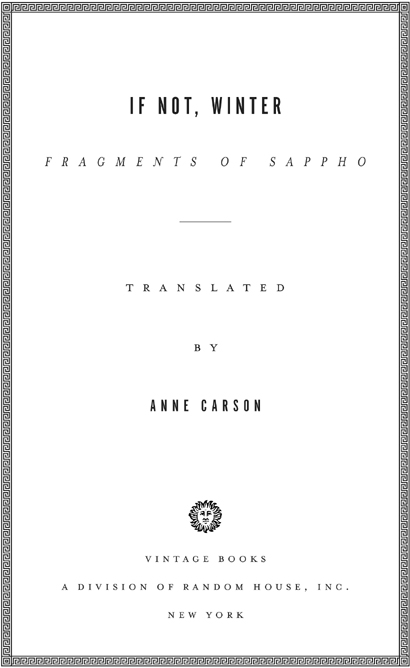INTRODUCTION
ON SAPPHO
Sappho was a musician. Her poetry is lyric, that is, composed to be sung to the lyre. She addresses her lyre in one of her poems (fr. 118) and frequently mentions music, songs and singing. Ancient vase painters depict her with her instrument. Later writers ascribe to her three musical inventions: that of the plectron, an instrument for picking the lyre (Suda); that of the pektis, a particular kind of lyre (Athenaios Deipnosophistai 14.635b); and the mixolydian mode, an emotional mode also used by tragic poets, who learned it from Sappho (Aristoxenos cited by Plutarch On Music 16.113c). All Sappho's music is lost.
Sappho was also a poet. There is a fifth-century hydria in the National Museum of Athens that depicts Sappho, identified by name, reading from a papyrus. This is an ideal image; whether or not she herself was literate is unknown. But it seems likely that the words to her songs were written down during or soon after her lifetime and existed on papyrus rolls by the end of the fifth century B.C. On a papyrus roll the text is written in columns, without word division, punctuation or lineation. To read such a text is hard even when it comes to us in its entirety and most papyri don't. Of the nine books of lyrics that Sappho is said to have composed, one poem has survived complete. All the rest are fragments.
Sappho lived in the city of Mytilene on the island of Lesbos from about 630 B.C. It is not known when she died. Her exile to Sicily sometime between 604 and 595 B.C. is mentioned in an ancient inscription (the Parian Marble) but no reason for it is given. Biographical sources mention a mother, a father, a daughter, a husband and three brothers of Sappho. She appears to have devoted her life to composing songs; scholars in Alexandria collected them in nine books, of which the first book alone had 1320 lines. Most of this is lost. Her face was engraved on the coinage of Mytilene (see G. M. A. Richter, Portraits of the Greeks, I.70-72) and Hellenistic poets called her the tenth Muse or the mortal Muse (see Palatine Anthology 9.506 and 7.14). The general tenor of ancient opinion on her work is summarized by a remark of Strabo:
Sappho [is] an amazing thing. For we know
in all of recorded history not one woman
who can even come close to rivaling her
in the grace of her poetry.
(13.2.3)
Controversies about her personal ethics and way of life have taken up a lot of people's time throughout the history of Sapphic scholarship. It seems that she knew and loved women as deeply as she did music. Can we leave the matter there? As Gertrude Stein says:
She ought to be a very happy woman. Now we are able to recognize a photograph. We are able to get what we want.
Marry Nettie, Gertrude Stein Writings 1903-1932
(New York, 1999), 461
ON THE TEXT
Breaks are always, and fatally, reinscribed in an old cloth that must continually, interminably be undone.
J. Derrida, Positions (Chicago, 1981), 24
In general the text of this translation is based on Sappho et Alcaeus: Fragmenta, edited by Eva-Maria Voigt (Amsterdam, 1971). I include all the fragments printed by Voigt of which at least one word is legible; on occasion I have assumed variants or conjectures from her apparatus into my translation and these are discussed below (see Notes). In translating I tried to put down all that can be read of each poem in the plainest language I could find, using where possible the same order of words and thoughts as Sappho did. I like to think that, the more I stand out of the way, the more Sappho shows through. This is an amiable fantasy (transparency of self) within which most translators labor. If light appears
not ruining the eyes (as Sappho says)
but strengthening, nourishing and watering
Aelius Aristides Orations 18.4
we undo a bit of the cloth.
ON MARKS AND LACKS
Sappho's fragments are of two kinds: those preserved on papyrus and those derived from citation in ancient authors. When translating texts read from papyri, I have used a single square bracket to give an impression of missing matter, so that] or [indicates destroyed papyrus or the presence of letters not quite legible somewhere in the line. It is not the case that every gap or illegibility is specifically indicated: this would render the page a blizzard of marks and inhibit reading. Brackets are an aesthetic gesture toward the papyrological event rather than an accurate record of it. I have not used brackets in translating passages, phrases or words whose existence depends on citation by ancient authors, since these are intentionally incomplete. I emphasize the distinction between brackets and no brackets because it will affect your reading experience, if you allow it. Brackets are exciting. Even though you are approaching Sappho in translation, that is no reason you should miss the drama of trying to read a papyrus torn in half or riddled with holes or smaller than a postage stampbrackets imply a free space of imaginal adventure.
A duller load of silence surrounds the bits of Sappho cited by ancient scholiasts, grammarians, metricians, etc., who want a dab of poetry to decorate some proposition of their own and so adduce exempla without context. For instance, the second-century-A.D. grammarian Apollonios Dyskolos, who composed a treatise On Conjunctions in which he wished to make a point about the spelling of the interrogative particle in different dialects of ancient Greek, cites from Sappho this verse:
Do I still long for my virginity?
Apollonios Dyskolos On Conjunctions 490 = Sappho fr. 107 Voigt
Whose virginity? It would be nice to know whether this question comes from a wedding song (and so likely an impersonation of the voice of the bride) or not (and so possibly a personal remark of Sappho's). Apollonios Dyskolos is not interested in such matters. Or consider the third-century-B.C. philosopher Chrysippos whose treatise On Negatives includes this negation from Sappho:
Not one girl I think who looks on the light of the sun will ever have wisdom like this.
Chrysippos On Negatives 13 = Sappho fr. 56 Voigt
Wisdom like what? And who is this girl? And why is Sappho praising her? Chrysip-pos is not concerned with anything except Sappho's sequence of negative adverbs. There is also the second-century-A.D. lexicographer Pollux whose lexicon includes the following entry:
A word beudos found in Sappho is the same as the word kimberikon which means a short transparent dress.
Pollux 7.49 = Sappho fr. 177 Voigt
Who would not like to know more about this garment? But the curiosity of Pollux is strictly lexical. In translating such stranded verse I have sometimes manipulated its spacing on the page, to restore a hint of musicality or suggest syntactic motion. For example the sentence cited by Chrysippos becomes:


